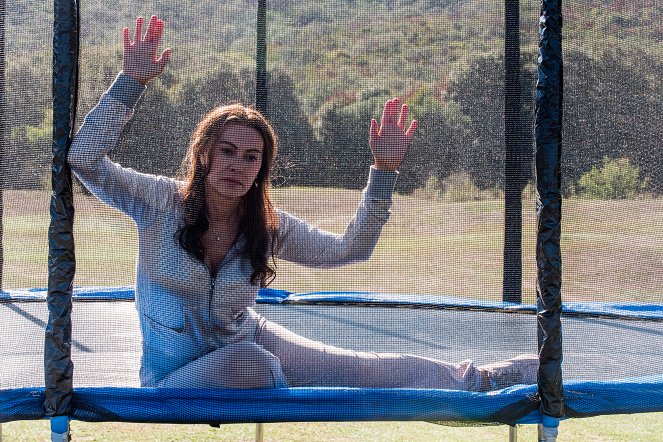Reżyseria:
Paolo SorrentinoZdjęcia:
Luca BigazziMuzyka:
Lele MarchitelliObsada:
Toni Servillo, Elena Sofia Ricci, Riccardo Scamarcio, Kasia Smutniak, Ricky Memphis, Roberto De Francesco, Fabrizio Bentivoglio, Euridice Axen (więcej)Opisy(1)
Paolo Sorrentino po kilkuletniej przerwie wraca do kin z komediodramatem Oni. Reżyser znów serwuje wybuchową mieszankę prowokacji i uwodzenia. Bawiąc się biografią byłego premiera Włoch, Silvio Berlusconiego - milionera i potentata medialnego - Sorrentino opowiada o zepsuciu, korupcji oraz odwiecznym mariażu seksu i władzy. A przede wszystkim o "dworze" chciwych pochlebców, jaki wyhodował wokół siebie jeden z najbardziej skompromitowanych współczesnych polityków. Za każdym Berlusconim, Orbanem, czy Trumpem są przecież jacyś "oni", czerpiący korzyści z populistycznych haseł, kryzysu demokracji i medialnych manipulacji. Oni są u władzy. Oni są cyniczni, niemoralni i zachłanni. Oni chcą uwielbienia. Oni to Silvio Berlusconi, jego świta i orbitujący wokół nich karierowicze, gotowi zrobić wszystko dla pieniędzy i politycznej chwały. Oni chcą uwieść tłumy. W świecie, gdzie najcenniejszą walutą jest młodość i seks, oni nie mają sobie równych. (Gutek Film)
(więcej)Materiały wideo (4)
Recenzje (2)
One sheep and lots of tits. Unused potential, unnecessarily long, dramaturgically only
semi-functional (a poor connection between the first and second halves), Loro lazily relies solely on
the attractiveness of the source material and the environment, formal refinement and Servillo’s
acting performance. We find nothing but shallow hints at any artistic reflection of the subject matter.
()
Women's breasts and bottoms (and not much else) are on display in approximately 40% of the scenes in Sorrentino's new film, mostly during the first fifty minutes, placing Loro in the company of The Wolf of Wall Street (there is also a lecture on the effects of a certain drug), Spring Breakers and Tinto Brass’s Caligula (decadence for the sake of decadence). Ten percent would have been enough to get the necessary point across. It’s the same with everything else in Sorrentino’s latest work. It is a film that seeks meaning, just like its protagonist, who fears aging, death and being forgotten. It presents a void of thought in an opulent package, which in and of itself bears a certain message, but you needn’t see it over and over again for two and a half hours. At the same time, Loro does not bring many motifs to fruition (one such example, which goes nowhere, is the formulation of parallels between lust and the desire for power, thus politics and exploitation of foreign bodies, starting with a prologue in which one of the characters devises his plan while looking at Berlusconi tattooed on the back of a woman he is having sex with). Paradoxically, the film could possibly benefit from being an hour longer rather than shorter (i.e. as in the case of its division into two parts, shown in Italian cinemas) and thus legitimise what comes across as self-serving and empty. No essential knowledge emerges from the final synthesis of the perspectives presented in the first and second of the three chapters of approximately equal length into which the film is divided (Berlusconi hardly appears in the first one). Even more conspicuously than Sorrentino’s previous films, Loro is reminiscent of a series of perfectly synched music videos packed with excellent ideas (the upper crust’s only real encounter with the real world happens when a garbage truck explodes in front of them) which when taken together, however, do not communicate much of anything or gel into a consistent form that would bear at least a somewhat relevant message and not merely repeat what Sorrentino was able to express more impactfully in Il divo. When in the conclusion the narrative finally focuses on the tragedy of real people, it is framed with the same unnatural pathos that characterises the rest of the film, which tells about fake people. Loro is a waste of talent on the part of the director and a waste of time for the viewer. 65%
()



Reklama